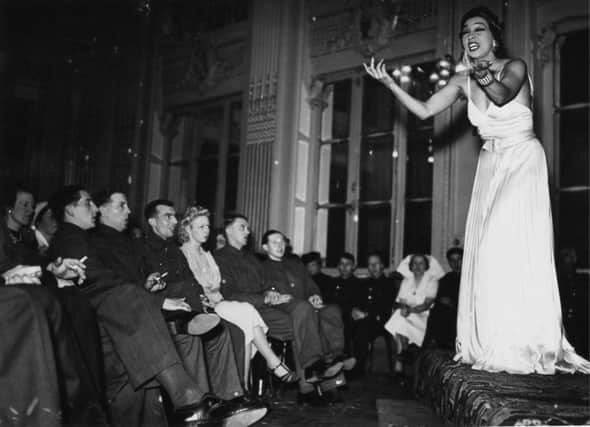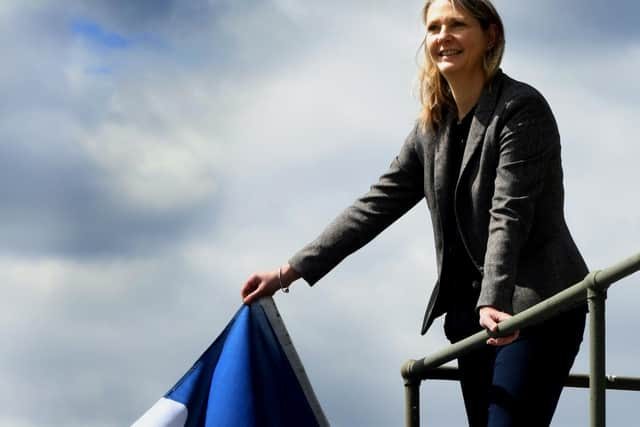Scandalous star who brought wartime glamour to York’s ‘French quarter’


When they left they took their memories with them, and but for the chance discovery of an airman’s diary, the visit of one of the world’s most glamorous and shocking stars might have been lost to the ages.
It was exactly 75 years ago that Josephine Baker dropped into the only RAF station in Britain to be operated by another country.
Advertisement
Hide AdAdvertisement
Hide AdIt was only just outside York, but the people, the language and even the food was French and Miss Baker was a national heroine.


“It must have been amazing. She was such an inspiring woman. In France she is loved to this day,” said Barbara George, director of the Yorkshire Air Museum, into which RAF Elvington has evolved.
Few in York now remember that it was once a French base, Ms George said, and fewer still would have known of its surprise visitor on May 16, 1945. Only a single photograph signed by Miss Baker is known to remain and there do not seem to have been any newsreel cameras present.
But her presence, a few days after VE-Day yet with the newly liberated France still a distant dream to the inhabitants of its Yorkshire outpost, must have seemed a vindication of all they had fought for, Ms George said.
Advertisement
Hide AdAdvertisement
Hide AdMiss Baker was an American singer who settled before the war in Paris, where audiences were bewitched by her exotic dancing and indifferent to her skin colour. When France fell, she worked for the Resistance, smuggling messages in her sheet music and in her underwear. After the liberation, General Charles de Gaulle awarded her the Croix de Guerre and the Legion of Honour.
It was Ms George, herself French, who discovered the diary of airman Pierre-Celestin Delrieu. Its translation reads: “Josephine Baker, yes, Josephine Baker came to surprise us one day, in all her charm. Proudly wearing the cap and uniform of the French Air Force, with two gold stripes, we saw Lt Baker climb on an improvised stage inside the largest of the hangars.
“All the Frenchmen of Elvington wanted to see and hear her. It was a spectacular triumph. The climactic point was when she sang Two Loves: My Country and Paris. There were cheers, encores and tears on people’s faces.”
At the museum, which will mark the anniversary of the visit on social media, Ms George said it remained unclear how or why Miss Baker had got to Elvington.
Advertisement
Hide AdAdvertisement
Hide Ad“It was purely French at the time. There was only one English person there – an intelligence officer called Mrs Plunkett who was also the only woman, because the French forces were not mixed.”
Some 2,500 men from two squadrons were based in York and their French cook did his best to create meals out of whatever was there, she said – somehow also managing to observe the custom of having a glass of red wine each day – a privilege not afforded the RAF.
An extract from the diary of airman Delrieu hints at how much Josephine Baker’s presence meant to the still-exiled French squadrons in Yorkshire.
He wrote: “I was lucky to have her sit in front of me, for a few moments, and able to chat with her, moved by her presence, moved by everything she represented from France, our country freed nine months ago but still so far from us.”
Advertisement
Hide AdAdvertisement
Hide AdMiss Baker had scandalised polite society before the war by dancing in a short skirt made of artificial bananas, a beaded necklace and nothing else. She later became an advocate for civil rights in her native US, refusing to perform for segregated audiences.
Editor’s note: first and foremost - and rarely have I written down these words with more sincerity - I hope this finds you well.
Almost certainly you are here because you value the quality and the integrity of the journalism produced by The Yorkshire Post’s journalists - almost all of which live alongside you in Yorkshire, spending the wages they earn with Yorkshire businesses - who last year took this title to the industry watchdog’s Most Trusted Newspaper in Britain accolade.
And that is why I must make an urgent request of you: as advertising revenue declines, your support becomes evermore crucial to the maintenance of the journalistic standards expected of The Yorkshire Post. If you can, safely, please buy a paper or take up a subscription. We want to continue to make you proud of Yorkshire’s National Newspaper but we are going to need your help.
Advertisement
Hide AdAdvertisement
Hide AdPostal subscription copies can be ordered by calling 0330 4030066 or by emailing [email protected]. Vouchers, to be exchanged at retail sales outlets - our newsagents need you, too - can be subscribed to by contacting subscriptions on 0330 1235950 or by visiting www.localsubsplus.co.uk where you should select The Yorkshire Post from the list of titles available.
If you want to help right now, download our tablet app from the App / Play Stores. Every contribution you make helps to provide this county with the best regional journalism in the country.
Sincerely. Thank you.
James Mitchinson, Editor
Comment Guidelines
National World encourages reader discussion on our stories. User feedback, insights and back-and-forth exchanges add a rich layer of context to reporting. Please review our Community Guidelines before commenting.